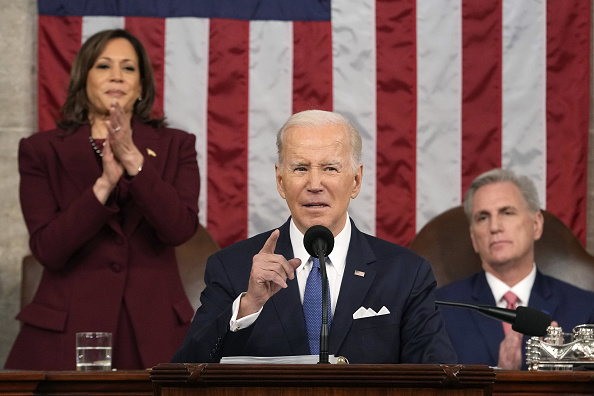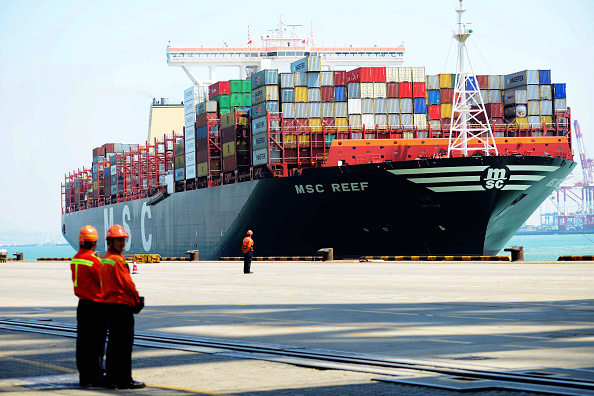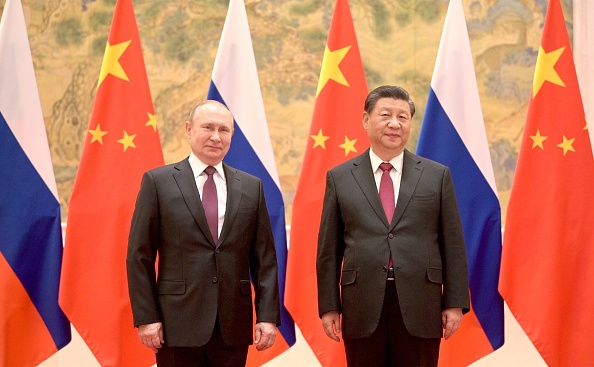
 Ballooning Tensions
Ballooning TensionsAs the Chinese balloon that was shot down off the coast of the United States last week remained at the forefront of U.S. public, media, and government attention, President Biden has said he does not believe it will negatively impact relations between the two countries.
Biden said he has not spoken to Chinese President Xi Jinping since the balloon was shot down, but pointed to continued contacts between officials in his administration and their Chinese counterparts.
"Look, I made it real clear to Xi Jinping that we're going to compete fully with China, but we're not looking for conflict. And that's been the case so far," Biden said.
Secretary of State Antony Blinken at the last minute postponed his trip to Beijing due to the balloon incident, pushing back a high-stakes meeting that was designed to cool rising tensions between the two powers.
During President Biden's annual State of the Union address to Congress, he mentioned China and President Xi Jinping at least seven times, with one indirect reference to the balloon incursion.
"As we made clear last week, if China threatens our sovereignty, we will act to protect our country. And we did," Biden said.
Despite repeated mentions of competition between the two nations, Biden said his administration is "committed to work with China where it can advance American interests and benefit the world."
In response, China said it was smeared in the address, with Foreign Ministry official Mao Ning saying the country is "opposed to defining the entire China-U.S. relationship in terms of competition."
"It is not the practice of a responsible country to smear a country or restrict the country's legitimate development rights under the excuse of competition, even at the expense of disrupting the global industrial and supply chain," Mao said.
Read more in "The U.S. and China Shouldn't Allow a Balloon to Derail Relations," by Doug Bandow, a Senior Fellow to the Cato Institute.
 High Flying Trade
High Flying TradeDespite escalating national-security tensions, trade between the United States and China hit a record high in 2022, with the bilateral goods trade between the countries rising to $690.6 billion, according to official U.S. data, topping the previous record of $658.8 billion in 2018.
Exports to China increased by $2.4 billion to $153.8 billion, while imports of Chinese products rose by $31.8 billion to $536.8 billion, according to the U.S. Bureau of Economic Analysis.
The world's two biggest economies have been in a trade war since 2018, however China is a top supplier of many high-demand products, such as cellphones, personal computers and solar panels. While some of the increase in trade between the two countries reflects the rising cost of living, the figures also point to how reliant the U.S. and China remain after years of trade conflict.
Experts have noted that the new data is showing little evidence of a "decoupling" of the Chinese and U.S. economies and "reshoring" of key manufacturing to the U.S., despite efforts by the Biden administration to curb investments that the U.S. can make in Chinese advanced computing and other high-technology sectors. The president has also increased the use of export controls targeting Chinese technologies and clamped down on imports of items linked to the use of forced labor, such as cotton and solar panels.
To further tighten the screws, the U.S. government may soon expand its restrictions to cover U.S. investment of technologies within Chinese borders.
 Sanction Strife
Sanction StrifeAs the one year mark of Russia's invasion of Ukraine approaches, member states of the Group of Seven are discussing potential sanctions on companies in China, Iran, and North Korea that are believed to be providing Russia with parts and technology that have military purposes, according to people familiar with the matter.
While the discussions are still in the beginning stages, and actions by each G7 state may vary, the goal is to coordinate a package of measures by February 24, the official one year date of the invasion.
The U.S. has previously raised concerns with China about non-lethal equipment provided to Russia, which was supposed to be a talking point on Secretary of State Anthony Blinken's Beijing trip that was postponed following the alleged Chinese spy balloon incident.
But Chinese Foreign Ministry spokesperson Mao Ning has stated that China "would never add fuel to the fire, still less exploit the crisis."
That being said, China's Foreign Ministry has also noted that China's strategic partnership with Russia will continue to gain momentum, particularly after Vice-Foreign Minister Ma Zhaoxu visited Russia earlier this month.
"Through joint efforts in the coming year, Russia and China will be able to strengthen and advance bilateral interstate ties," the ministry said in a statement.
It's also anticipated that Chinese leader Xi Jinping will make a trip to meet Russia's Vladimir Putin later in the spring, though the trip has yet to be officially confirmed.
Read more in "Where Russia Went Wrong," by Xiao Bin, a Deputy Secretary-general at the Center of SCO Studies.
Prepared by China-US Focus editorial teams in Hong Kong and New York, this weekly newsletter offers you snap shots of latest trends and developments emerging from China every week, while adding a dose of historical perspective.
- 2023-02-03 Hot Air
- 2023-01-27 Spheres of Influence
- 2023-01-20 China's Davos Pitch
- 2023-01-13 Strategic Encounters
- 2023-01-06 Common Challenges
- 2022-12-23
- 2022-12-16 All in On Africa
- 2022-12-09 Seeking Stabilization
- 2022-12-02 Turf Tension
- 2022-11-18 Thawing Ties?
- 2022-11-11 Face to Face
- 2022-11-04 The Pacing Challenge
- 2022-10-28 Third Time’s the Charm
- 2022-10-21 United as Steel
- 2022-10-14 Party Time
- 2022-10-07 Elections Incoming
- 2022-09-30 Hot Intrigue
- 2022-09-23 Global Gridlock
- 2022-09-16 Injecting Stability